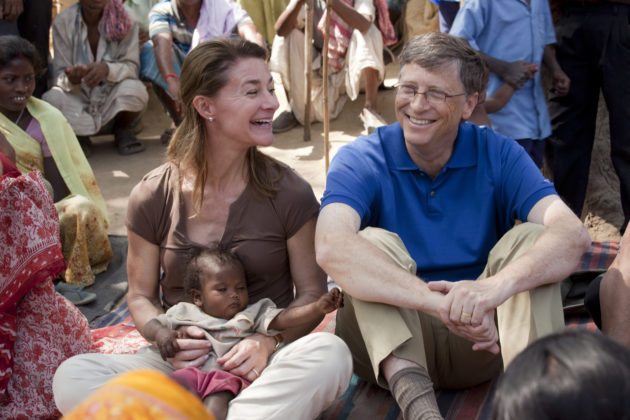
Created more than 20 years ago, the Bill & Melinda Gates Foundation has been a global leader in philanthropy. So what happens when it’s “Bill and Melinda” no more?
With news breaking Monday of the divorce between Bill and Melinda Gates, questions are swirling about the future of their foundation.
In terms of assets and influence, the foundation “is the most important philanthropic foundation in the world,” said Benjamin Soskis, co-founder and editor of HistPhil, a site dedicated to the history of philanthropy. “To the extent that this will have an effect on the foundation itself, it’s of immense consequence.”
The Seattle-based organization has an endowment worth nearly $50 billion, and has issued close to $55 billion in grants over the years.
The couple said in a shared tweet announcing their plans to divorce that they believe in the mission of the foundation and will continue their work together there.
Their organization echoed the sentiment in its statement: “Bill and Melinda will remain co-chairs and trustees of the Bill & Melinda Gates Foundation. No changes to their roles or the organization are planned. They will continue to work together to shape and approve foundation strategies, advocate for the foundation’s issues, and set the organization’s overall direction.”
The foundation provides grants in wide-ranging areas, including global health and vaccines, gender equality programs, economic development and agriculture in lower-income countries, and improving education in the U.S. Since the start of the COVID-19 pandemic in early 2020, the organization invested at least $1.75 billion in battling the virus, helping pay for the production and purchase of medical supplies.
The Gateses predictably asked for “space and privacy” in their tweet. But their tremendous wealth — Bill Gates, who co-founded Microsoft and is worth an estimated $130.5 billion — combined with the significance of the philanthropic work in which they have played such central, public roles makes that difficult, if not impossible.
While it’s a personal crisis, “by definition they’re public events, in a way that is uncomfortable,” said Soskis, who is also a research associate at the Urban Institute think tank, which receives funding from the Gates Foundation.
In 2010, the couple joined Warren Buffett in creating the Giving Pledge, an effort that asks billionaires to vow to give away the majority of their wealth while alive or in their will — instead of bestowing their estates to descendants. Bill Gates is 65 and Melinda Gates is 56 years old.
The focus and approach of the foundation has shifted over time from a more technocratic-style emphasizing data, testing and research — a strategy that aligns with Bill — to a more humanistic, community-engaged approach that hews more closely with Melinda, said experts in philanthropy.
Melinda’s “not the business person in the family. She’s not the capitalist that was sued by the Justice Department [for antitrust behavior] and built the global corporation,” said David Callahan, editor of Inside Philanthropy, a charity watchdog site.
Bill Gates Sr., formerly the third co-chair of the foundation, died in September 2020.
While the couple says they’ll keep working together, some wonder if Melinda would create her own foundation to direct increased attention to efforts such as women’s empowerment — the focus of her 2019 book, “The Moment of Lift” — and possibly more political actions that impact courts or elections.
“If you really care about gender equity, there’s a good chance you’ll go down a more robust, progressive giving path,” Callahan said.
He pointed to the fallout from the 2019 divorce of Amazon founder Jeff Bezos and MacKenzie Scott. Following their separation, Scott has established herself as a major philanthropic donor, giving away $5.7 billion last year to wide-ranging social causes with a more liberal bent. Until recent years, Bezos and Amazon were criticized for their limited philanthropic giving.
“It could be that Melinda Gates has been waiting for the freedom to do her own thing, that it’s going to be a big, blazing story of a new and independent Melinda Gates philanthropy that looks different than what came before, which is what we saw with MacKenzie Scott,” Callahan said. “Or it could be status quo with some tweaks.”
Over the years, Bill and Melinda Gates have staked out their own focus areas in giving and investing.
Bill Gates in 2015 launched Breakthrough Energy Ventures, a $2 billion fund to support carbon-cutting startups. That initiative has evolved into Breakthrough Energy, an umbrella organization that spans six programs working to battle climate change. Bill Gates recently published a climate book and has spent months doing interviews and discussing climate challenges and solutions.

Also in 2015, Melinda Gates established an organization called Pivotal Ventures, an independent executive office that gave her the opportunity to pursue ideas, projects and investments that might not fit within the structure of the Gates Foundation. Melinda, who met Gates while herself a Microsoft employee, published her book in 2019, which shared her firsthand encounters with women worldwide who are working to improve their own and their family’s lives.
While the Gates Foundation is the largest, there are other philanthropies that are jointly led by ultra-wealthy couples, including Facebook’s Mark Zuckerberg and his wife Priscilla Chan, former Microsoft CEO Steve Ballmer and his wife Connie, and hedge-fund founder John and Laura Arnold. The private organizations are largely beholden only to their founders, and sometimes criticized for their lack of accountability and transparency.
“With these couples, these ongoing enterprises, it’s always hard to know who is pulling for what priorities,” Callahan said.
The big takeaway, Callahan and Soskis agreed, is the Gates’ divorce demonstrates the outsized, unpredictable repercussions that follow the concentration of wealth in the hands of a few people. All of a sudden news of a divorce isn’t a gossip column curiosity, but a significant event with potential societal ramifications.
“It’s another illustration of a universe in which individuals and not institutions are a defining player on the landscape,” Soskis said.



